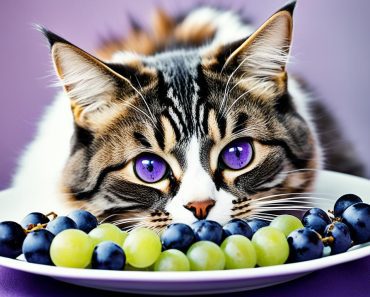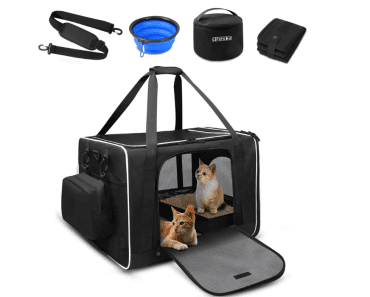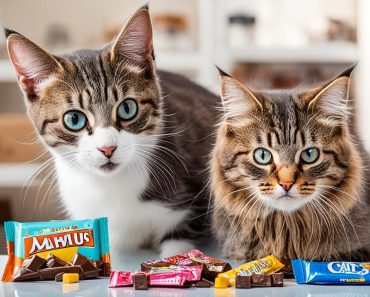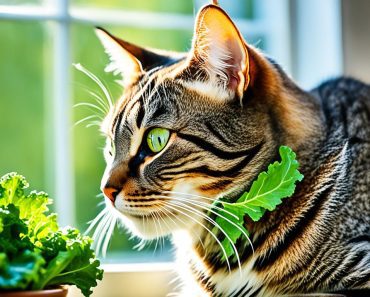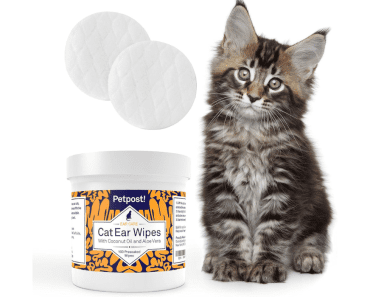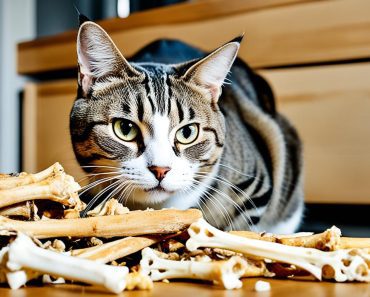I often wonder about the foods that are safe for my furry friend, Kitty. As a cat owner, I want to ensure that I am providing her with the right nutrition and keeping her health in mind. One question that comes to mind is, can cats eat cucumber?
Can Cats Eat Cucumber? Yes, they can, but in moderation.
Cucumbers, a popular vegetable, can be a refreshing and hydrating treat for cats. They are about 95% water, which can help keep our feline companions hydrated, especially during hot weather. Not only that, cucumbers are also low in calories, making them a suitable option for cats that need to lose weight or maintain a healthy weight.
Cucumbers pack a nutritional punch for our feline friends as well. They contain essential vitamins and minerals like vitamin K, potassium, and magnesium, which can contribute to a cat’s overall health. However, it’s important to note that while cucumbers can offer health benefits, they should be fed in moderation and not as a primary source of food for cats.
Before introducing cucumbers into your cat’s diet, it’s important to consider any possible risks. Feeding excessive amounts of cucumbers can lead to digestive issues, such as diarrhea or an upset stomach. Additionally, it’s crucial to wash cucumbers thoroughly to remove any pesticide residue before offering them to cats. It’s also essential to monitor your cat’s reaction when introducing this vegetable to their diet, as some cats may have allergic reactions to cucumbers.
Now that we know a bit more about cats and cucumbers, let’s explore further whether cucumbers are safe for our feline friends to eat, their benefits, potential risks, and how to safely include cucumbers in their diet.
Are Cucumbers Safe for Cats to Eat?
Cats can safely eat cucumbers in moderation. Cucumbers are low in calories and high in water content, which can help keep cats hydrated. However, it’s important to be cautious and introduce cucumbers gradually to a cat’s diet. Some cats may have allergic reactions to cucumbers, so it’s crucial to monitor their response when offering this vegetable. Additionally, feeding excessive amounts of cucumbers can lead to digestive issues, such as diarrhea or an upset stomach. It’s always best to consult with a veterinarian before making any significant changes to a cat’s diet.
The Benefits of Cats Eating Cucumbers
Cats can benefit from including cucumbers in their diet in several ways. First and foremost, cucumbers are high in water content, which helps to keep cats hydrated, especially during hot weather. Hydration is vital for cats to maintain proper organ function and overall well-being.
In addition to their hydrating properties, cucumbers are a low-calorie option for cats. This makes them a suitable treat for cats that need to lose weight or maintain a healthy weight. With obesity becoming a common health issue among cats, incorporating low-calorie treats like cucumbers can be helpful in managing their weight.
Cucumbers also offer essential vitamins and minerals that contribute to a cat’s overall health. They are a good source of vitamin K, which is important for blood clotting and bone health. Additionally, cucumbers contain potassium and magnesium, which are essential for muscle function and maintaining a healthy heart.
It’s important to note that while cucumbers provide health benefits, they should be offered to cats in moderation and not as a primary source of food. Cats are obligate carnivores and require animal-based proteins as the main component of their diet. Cucumbers should only be given as an occasional treat or added as a supplement to their existing balanced diet.
- Hydration: High water content helps to keep cats hydrated
- Weight Management: Low in calories, suitable for cats that need to lose or maintain weight
- Essential Nutrients: Contains vitamins K, potassium, and magnesium for overall health
When introducing cucumbers to your cat’s diet, it’s always important to monitor their response and consult with a veterinarian if you have any concerns. Every cat is unique, and their dietary needs may vary. By offering cucumbers in moderation and alongside a balanced diet, you can provide your feline friend with a refreshing and nutritious treat.
Risks and Precautions of Cats Eating Cucumbers
While cucumbers are generally safe for cats to eat, it’s important to be aware of the risks and take necessary precautions. Feeding excessive amounts of cucumbers to cats can lead to digestive issues, such as diarrhea or an upset stomach. To ensure the safety of your feline friend, it’s crucial to wash cucumbers thoroughly before offering them, as this helps remove any pesticide residue that may be present on the skin.
Additionally, some cats may have allergic reactions to cucumbers, so it’s important to monitor their response when introducing this vegetable into their diet. Keep an eye out for any signs of discomfort or adverse reactions, such as itching, swelling, or difficulty breathing. If you notice any unusual symptoms, it’s best to discontinue feeding cucumbers and consult with a veterinarian.
As with any dietary change, it’s always recommended to consult with a veterinarian before adding new foods to your cat’s diet. They can provide personalized guidance based on your cat’s specific health needs and dietary requirements. Veterinarians can also advise on portion sizes and frequency of feeding cucumbers to ensure your cat’s overall well-being.
Remember, while cucumbers can be a healthy addition to a cat’s diet in moderation, they should not replace a balanced and species-appropriate diet. Cats are obligate carnivores, which means they require animal-based proteins as the primary component of their diet. Vegetables, including cucumbers, should only be offered as occasional treats to supplement their nutritional needs.
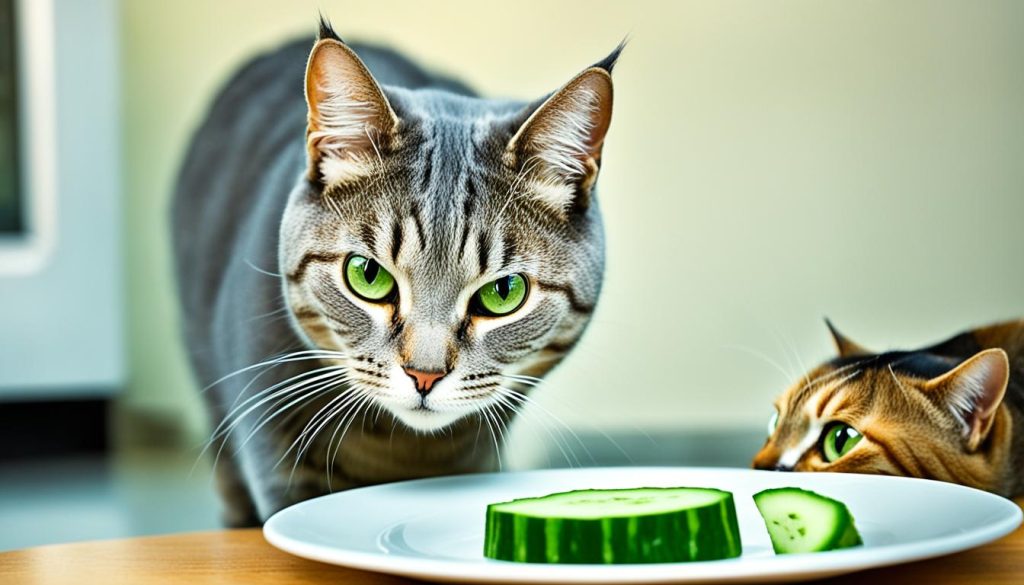
In the next section, we’ll discuss how to safely feed cucumbers to cats, including tips on portion sizes and preparation methods.
How to Safely Feed Cucumbers to Cats
If you decide to feed cucumbers to your cat, it’s important to do so safely. Here are some tips to ensure your cat can enjoy cucumbers without any issues:
- Cut cucumbers into small, manageable slices: This will prevent any choking hazards and make it easier for your cat to eat.
- Remove the seeds: The seeds of cucumbers can be difficult for cats to digest. It’s best to remove them before offering the cucumber to your cat.
- Offer cucumbers in moderation: While cucumbers can be a healthy treat for cats, they should not be the primary source of food. Use them as an occasional treat to complement your cat’s balanced diet.
- Monitor your cat’s reaction: When introducing cucumbers to your cat’s diet, observe their response. If you notice any adverse effects such as vomiting or diarrhea, discontinue feeding cucumbers immediately.
Remember, your cat’s safety and overall well-being should always be the top priority when introducing new foods to their diet. By following these guidelines, you can safely incorporate cucumbers into your cat’s occasional treat rotation.
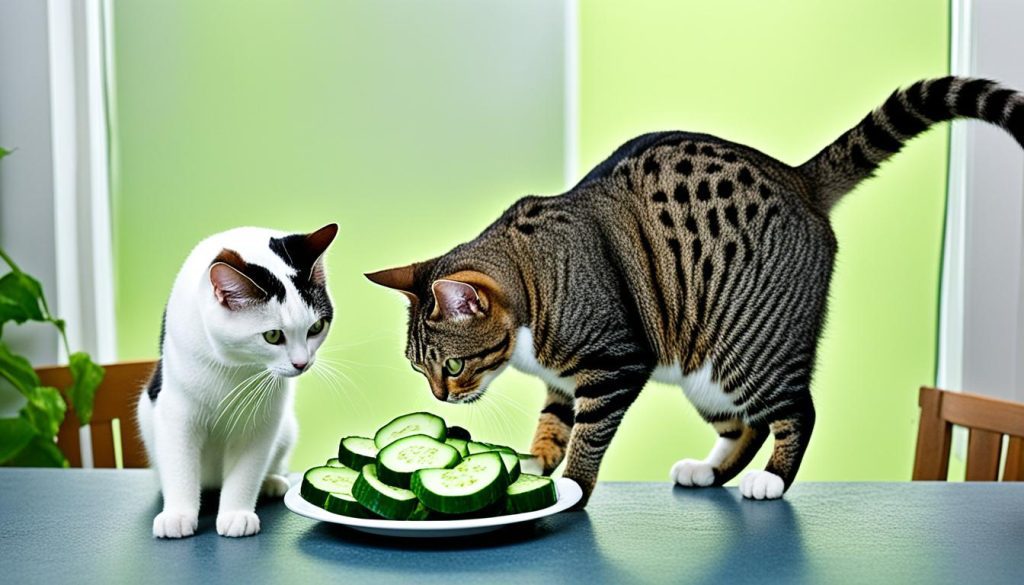
Can Cats Eat Other Vegetables?
Yes, cats can enjoy certain vegetables in moderation. While cats are obligate carnivores and require animal-based proteins as the main component of their diet, some vegetables can be a healthy addition to their meals. It’s important to remember that vegetables should only be offered as an occasional treat and should not replace a balanced and species-appropriate diet for cats.
Some cats may particularly enjoy vegetables like cooked carrots or steamed green beans. These vegetables can provide additional nutrients and fiber that can benefit a cat’s digestive system. However, it’s crucial to introduce new vegetables slowly and observe how your cat responds to them.
When offering vegetables to your cat, it’s essential to prepare them in a cat-friendly way. Cut vegetables into small, bite-sized pieces to prevent choking hazards, and ensure they are cooked or prepared in a manner that makes them easy for cats to chew and digest.
Remember, each cat is unique, and their preferences and tolerances may vary. If you’re unsure about whether a specific vegetable is safe for your cat, it’s always best to consult with a veterinarian who can provide personalized dietary recommendations for your furry friend.
Conclusion
Cats can safely enjoy cucumbers as part of their diet. Cucumbers are a hydrating treat that can help keep cats refreshed, especially during hot weather. They are low in calories, which makes them suitable for cats that need to manage their weight. Additionally, cucumbers contain essential vitamins and minerals, such as vitamin K, potassium, and magnesium, which contribute to a cat’s overall health.
However, it is important to introduce cucumbers gradually and in moderation. Monitoring a cat’s response to this new addition is crucial, as some cats may have allergic reactions or experience digestive issues. Prioritizing a cat’s safety and consulting with a veterinarian before making any significant dietary changes is always recommended.
While cats can enjoy cucumbers, it’s essential to remember that they are obligate carnivores and require animal-based proteins as the main component of their diet. Vegetables, including cucumbers, should only be offered as occasional treats and not as a substitute for a balanced feline diet.
Cats and cucumbers can coexist harmoniously when introduced responsibly. So, if you decide to offer your feline friend cucumbers, do so with caution, always considering their individual needs and consulting with your veterinarian for personalized guidance.

